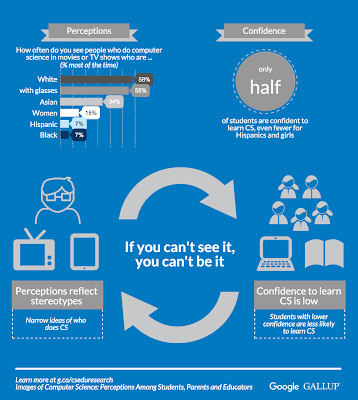Editor's note: For CS Education Week, we are celebrating the educators that lead the way by making CS education accessible and inclusive. Stay tuned all week for more programs and stories that celebrate CS champions every day of the year.
Today, Google’s Computer Science for High School (CS4HS) award program opens applications for the 2016 year. Since 2009, CS4HS has provided funding for over 400 computer science teacher professional development (PD) opportunities around the globe. Through these PD opportunities over 20,000 teachers have gained confidence in their understanding of computer science (CS) and learned valuable skills for teaching CS to students. Despite these accomplishments, a recently published Google-Gallup study found that nationwide many teachers incorrectly identified “creating documents or presentations” and, to a lesser extent, “searching the Internet” as part of computer science. If teachers better understand what CS is, learning opportunities can branch beyond literacy and delve deeper into CS concepts, allowing students to acquire skills that are useful and in demand across a growing number of fields. What we learn from research drives why and how we invest in CS teacher PD.
 |
| Ramona Santa Maria, CS4HS facilitator from Buffalo State College, problem solving with CS teachers |
When the new AP Computer Science Principles course launches in 2016, the College Board anticipates that 18,000 students will be interested in taking the AP exam. In an effort to help prepare educators to teach the new AP course, we will fund applications that include PD content that is centered around some or all of the Seven Bigs ideas from the AP Computer Science Principles Framework.
Also, based on research, we believe that regionally based PD allows practitioners to tailor the learning objectives to meet the specific needs of teachers in their areas. We encourage colleges, universities, and educational non profits from all regions of the country to apply.
Funding across the globe
In Canada, Europe, the Middle East, and Africa, CS4HS is looking to fund applications that include strong plans for the establishment of new, or work with existing COPs that support ongoing professional development as well as PD content that is focused on the critical principles of computer science. Australia/New Zealand will continue to support PD focused on national CS curriculums and China will continue to support their App Inventor CS PD model.
 |
| CS4HS organizer, Alfredo Perez from Columbus State University, providing in-class mentorship for a new CS teacher |
Get started with your application
Criteria vary from region to region so please visit the CS4HS website to learn more about the eligibility requirements and deadlines specific to your region and to get started on your application. We hope this year will provide many opportunities to partner with the CS education community to grow and strengthen the CS teacher community around the globe. We hope you’ll be a part of it, and look forward to reviewing your application.
Stay connected
Join the CS4HS Google+ community to connect with past CS4HS organizers and learn about HangOuts on Air we’ll be hosting during the application process. And be on the lookout for an announcement later this month regarding the launch of the RISE Awards for funding student outreach programs.
